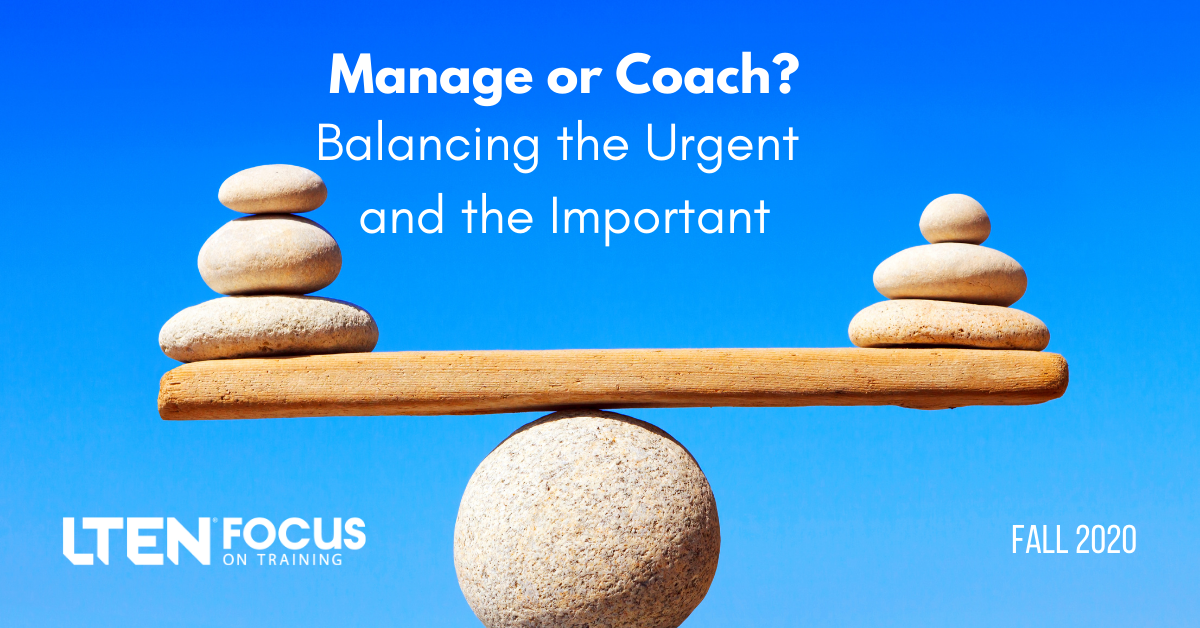
FEATURE STORY – By Harriet Butler and Doug Murray
Manage or Coach? Balancing the Urgent & the Important
When leaders both manage and coach, there’s stronger, more steady performance when the going gets tough.
We are well into a year with one of the toughest and most unpredictable business climates in decades – or perhaps in most people’s lifetimes. While the broader tectonic shifts driven by COVID-19 will likely continue to reverberate for quite some time, how are sales teams in pharmaceutical, biotech, medical device and diagnostic companies finding a firm footing and building back sales?
The answer is found in how they strike the balance between the urgent and the important. Sales managers are key to that, of course, especially in how they shift from managing to coaching. Our aim here is to explore the issues and challenges in making that shift.
But first a bit of quick shorthand: Most sales leaders know how to manage what’s urgent and most pressing – especially in challenging times. The key distinction, however, is how they coach their teams to focus with confidence on issues that are most important.
Shifts & Balance
Before we get into the details, here’s a quick snapshot of the big picture: The COVID-19 crisis has driven a number of key shifts in the life sciences world – some of which got their start in the pre-COVID time but perhaps escalated in the past six months. These trends include changes to the rules of engagement, growing price pressure and a dramatic reduction in access to customers.
 Those trends – and others – typically drive what we call the tyranny of the urgent, a natural and quite common inclination for many leaders to focus a majority of their energy on what’s most necessary now. In demanding times like these, the tyranny of the urgent has everyone obsessed about immediate deadlines, mitigating risk, minimizing crises and a blinding focus on instant data.
Those trends – and others – typically drive what we call the tyranny of the urgent, a natural and quite common inclination for many leaders to focus a majority of their energy on what’s most necessary now. In demanding times like these, the tyranny of the urgent has everyone obsessed about immediate deadlines, mitigating risk, minimizing crises and a blinding focus on instant data.
And though it’s vital to focus on the most urgent issues when you’re challenged, it’s also critical to balance that with an eye on what else is important and that might not be as immediately pressing. The focus on what’s important involves how your people are doing, what they need to adapt and address current realities, and the fundamentals of good business execution to deliver sustainable results over time.
Why is this balance so key? The answer might be obvious to you, but if it isn’t, here’s the best way to look at the value of striking such a balance: When your people are aligned around sound business execution, your ability to weather whatever the market throws at you is greatly enhanced. Organizations that equip their leaders to both manage and coach have stronger, more steady performance when the going gets tough.
Driving Performance
What can sales managers do to create fertile conditions to foster a coaching mindset with their top people? A simple framework that explores three drivers of performance – Beliefs, Planning and Actions – offers a good start:
- Beliefs: How salespeople feel about their ability to sell in the new environment may have as much to do with their success as any aspect of their jobs. While coaching skills is important, sales managers must recognize the need to coach beliefs and attitudes. Engaging salespeople in a discussion about their beliefs will provide insights into how they view their ability to do the job in the “new
 normal.”
normal.” - Planning: Both long-term strategic and pre-call plans have never been as essential to sales success as they are now. With the availability of resources like LinkedIn, customer websites and social media, customers expect salespeople to do their homework. “Winging it” and generic conversations are a thing of the past. Many salespeople are quickly realizing preparation is a non-negotiable activity. However, others need coaching to ensure planning becomes a consistent sales behavior.
- Actions: Selling to a broader coalition of stakeholders presents another coaching opportunity. Even if salespeople believe they can be successful, making the transition will likely stretch their comfort zones.
In building a coaching mindset, these seven activities can help to strike the balance between managing what’s urgent and coaching what’s important:
- Reinforce a consistent application of your sales process.
- Encourage the use of communication principles that engage customers.
- Build accountability to consistently prepare so every conversation counts.
- Communicate how to sell value beyond product.
- Help people recognize how attitudes, values and beliefs influence outcomes.
- Provide resources for both personal and professional development.
- Celebrate the success with your team.
How can you bring rigor to coaching for consistent results? Here’s how to get started:
- Set time aside each week to plan for important coaching activities.
- Discuss what’s important with your people during one-to-one sessions.
- Make time on team calls to review what you’ve defined as important.
- Gain top-down support by encouraging senior leaders to communicate important activities.
- Ask for feedback from the field to ensure there is a balance between the urgent and important.
Final Thought
You might have gotten this far and concluded, easier said than done. And, of course, the shift we’re exploring here takes time to become part of your regular routines with your sales team. But don’t make the mistake seen with many people who view coaching as only requiring a huge time commitment and lots of planning. When it’s viewed that way, it’s not uncommon for managers to conclude that they don’t have time to coach.
Coaching does need to be consistent and thorough. But remember that you have many opportunities a day to coach your people in what we call coaching moments. Every conversation, every interaction with your salespeople provides opportunities to reinforce a focus on what’s important in the ever constant battle against the tyranny of the urgent.
Harriet Butler is executive vice president and partner and Doug Murray is chief commercial officer for healthcare at Integrity Solutions. Email Harriet at hbutler@integritysolutions.com and email Doug at dmurray@integritysolutions.com.








